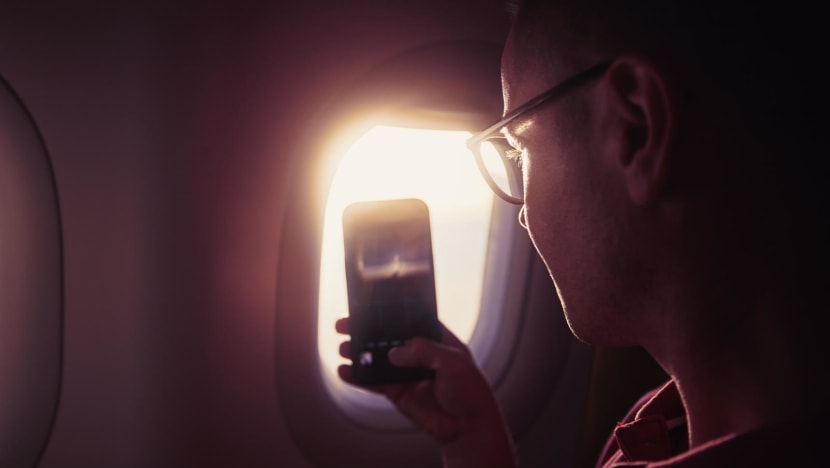‘Close window shades’: Plane passengers ordered to do so by China’s anti-spy agency at military-civilian airports
Used for both military and civil aviation, these dual-use facilities comprise almost a third of airports in China, according to the Ministry of State Security.

A man takes a photo through an aircraft window with his phone in this stock image. (Photo: iStock/Chalabala)

This audio is generated by an AI tool.
SINGAPORE: China’s anti-spy agency has urged plane passengers to keep window shades down during take-off or landing at military-civilian airports, warning of potential national security risks if this is not followed.
Sensitive military information could be leaked if photos or videos were taken, explained the Ministry of State Security in a WeChat notice on Monday (Jun 24).
As the name suggests, military-civilian airports are used for military and civilian aviation. These dual-use facilities often deploy important military equipment, said the ministry, adding that taking pictures or videos of such sensitive assets or areas is prohibited.
The anti-spy agency also referenced a recent case involving a foreign national, noting that it has garnered plenty of attention and discussion online.
The state-run Global Times, citing local news reports, reported that on Jun 12, a foreign passenger on a flight to Beijing from Yiwu, Zhejiang had allegedly used his phone to photograph a military-civilian airport by wedging it outside the window shade.
The incident was reported by a fellow passenger, and Yiwu airport staff said the matter would be reported to the police. The post of the incident on social media platform Weibo has been read more than 85 million times, according to the Global Times.
In its post on Monday, the Ministry of State Security also cited a similar case at another military-civilian airport along the southeastern coast. During take-off, a passenger surnamed Liu ignored cabin crew reminders and placed his phone “between the aircraft’s window shade and the window”.
Liu then repeatedly lifted the window shade and recorded the airport’s surrounding facilities, buildings and military aircraft, intending to show the footage off on his social media, said the ministry.
The airport stopped the plane from taking off upon realising not all the window shades were pulled down. The jet was only allowed to depart after authorities investigated the incident and ensured the footage was deleted, the ministry noted.
Liu was detained for seven days for allegedly “disrupting public transportation order”. “Liu’s behaviour not only caused the delay of the airline, (his actions) also affected the travel plans of other passengers,” said the ministry.
ENSURING NATIONAL SECURITY
According to the Ministry of State Security, nearly a third of airports in China are designated for dual civilian-military use. Most of them are located near the coast, border areas, and places with “prominent strategic use” and of “important military value”.
To ensure national military security and prevent passengers from “inadvertently” accessing and leaking national military secrets, the window shades of civilian aircraft must be pulled down during take-off, landing and taxiing at such dual-use airports, the ministry reminded.
Passengers are also not allowed to photograph, video or upload such content online, said the ministry, pointing out that this is common practice around the world when it comes to protecting military secrets.
It added that taking photographs of military facilities and equipment is an act that “seriously endangers national security”. “Protecting national security is the responsibility and obligation of every citizen,” said the ministry.
China’s top spy agency has regularly issued warnings on national security risks since emerging from the shadows and setting up an official account on WeChat in August last year.
It recently trained its sights on drones - urging people in a post last Thursday to report suspicious drone use in sensitive areas and warning drone users to be careful not to leak sensitive information, according to the South China Morning Post.
The ministry warned that it had investigated and dealt with many cases involving illegal drone flights, photographing of confidential facilities and sensitive areas, as well as sharing of the information online.
“These illegal acts have created the risk of leaking [details] of our country’s core military facilities and important geographic information.”















